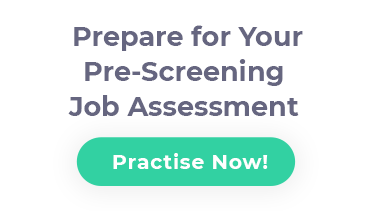Assessment Centre Preparation: Tips & Practice Resources
Many companies are using assessment centres to assess applicants now. They use an assessment centre as the final stage in the pre-employment process before a final decision is made. Since they are the final event and are relatively expensive, those job-seekers and graduates who receive invites to an assessment centre are the ones that the employer believes have the highest potential for fitting the job position they are seeking to fill.
The assessment centres usually take place either in an employer’s office or in specific private assessment centres, though sometimes hotel conference rooms may also be utilized. This assessment combination helps employers to understand the applicant’s competencies and performance at work in a more rounded way than a traditional interview would allow them to do. This makes them a popular option with both the employer and the candidates since it gives a more fair evaluation of each candidate and looks more at what the individual can do instead of what they know.
What Is an Assessment Centre?
Assessment centres are a combination of tasks and activities intended to test suitability for various job positions. They are highly customizable, so they are often used with many types of positions and are not restricted to only certain kinds of jobs. The candidate is evaluated with a series of individual and group tasks during this final stage in the assessment process. In the assessment centre, applicants are given a chance to demonstrate their skills and capabilities in a way that goes beyond what traditional interview questions and answers would allow.
Assessment centres usually include the following types of activities:
What to Expect at an Assessment Centre?
The set of activities typically takes around four to eight hours, which are spread out over a period of one to two days, though mass recruitment processes can take up to three. The centre is often run by the company’s HR department and is intended to simulate situations on the job. To this end, assessment centre organizers may bring in actors to play the role of upset or confused customers in the role-playing exercises common to assessment centres.
This gives a more realistic environment for assessing a job-seeker or graduate applying for the position. When combined with the heavy workload in assessment centres, the way candidates respond to the stress and challenge of an assessment centre allows employers to better understand how they may perform on the job.
Scoring and Competencies
Scoring is done by trained assessors who are, in an ideal situation, unbiased and fair. The candidates’ scores are based on the opinions of all the assessors instead of just one to help make the assessment centre fair and useful. One assessor will be assigned to each candidate for the exercise, and the assessors will rotate through the candidates throughout the day.
The assessors are typically a mix of HR consultants and line managers. They will score each candidate’s actions against specific competency frameworks for the job position and will discuss all aspects of performance amongst themselves before making hiring decisions.
In addition, there are some key competencies and abilities the assessors look for when reviewing answers and actions from a particular candidate. They are as follows:
- Adaptability and creativity
- Analytical thinking and commercial awareness
- Communication skills and negotiation
- Leadership and decision-making
- Organization and planning
- Teamwork and persuasion
- Time Management
Individual companies may be looking for some or all of these in addition to other specific qualities. Assessment centres give an opportunity for assessors to look for these traits in a candidate, so individuals invited to an assessment centre should anticipate that they will be scored numerically against a competency framework that includes all of the competencies their position requires.
How to Prepare for Assessment Centres?
Assessment centres cannot be prepared for in the same way that a traditional test or interview can be. As mentioned earlier, the assessment centres focus on what you can do, not what you know. So, unlike psychometric tests, you cannot memorize some set of information and expect to fill in all the right bubbles to do well. Instead, experience is more important than knowing all the correct responses.
With that said, there are some things you can do to prepare for an assessment centre to increase your comfortability with the various exercises, questions you may be asked, and ways to respond to exercises in order to show that you are the best fit for the job.
Health
When it comes to preparing, start with your own health. This area is often overlooked, but it is important for anyone who wishes to look and feel their best on assessment day. Looking and feeling well will boost confidence and performance.
Some of the things you should do include exercising and getting proper rest. To start with, try to exercise at least three times a week for a month before the assessment centre date to lessen built-up stress and anxiety while promoting a greater sense of well-being come assessment day. Make sure you also get enough sleep on a regular schedule for a few weeks before the tests and exercises.
Along that same grain, eating right leading up to the assessment centre and eating a healthy, balanced breakfast on the morning of the assessment centre will help to keep those taking the tests to be alert and energized during their exercises and assessments. Make sure to remain well-hydrated as well.
Practising and Studying
Indirect preparation for the assessment centre, job-seekers and graduates should take time to practice potential exercises with friends and family. This will give a greater sense of confidence in dealing with the real exercises on assessment day.
While preparing and practising, reflect on the rest of the process up to this point and find places that caused difficulty. Try to work on those areas from the perspective of the assessment centre to ensure none of them will jeopardize a good performance on the assessment centre. Also take the time to review the competencies the employer is looking for to make sure you display them in your responses and actions on assessment day.
Assessment Day Tips
Beyond the basics of preparation, using the list below to help you prepare may prove beneficial.
- Be assertive during all exercises.
- Focus more on good performance than on mistakes made, and do not focus on other candidates.
- Let assessors see your overall working methodology.
- Make sure you draw others in with group discussions, listen, and cooperate.
- Prioritize time—many candidates fail to give the best impression of themselves because they didn’t utilize time in the best ways possible.
- Dress business professionally, be on time, and have everything you need with you.
- Be diplomatic when you need to stick up for your views and do not be drawn into arguing, interrupting, or criticizing when dealing with others.
- Talk to the other candidates during breaks or exercises (when allowed) to establish connections before group exercises are started. Be warm, polite, and approachable with everyone.
- Relax and let your personality shine through. No matter what, stay positive.
- Focus on good delivery of a few key points instead of the details or always having the ‘right’ answer.
Conclusion
In the end, while it is not possible to practice or prepare for every part of the assessment centre you may be invited to, it is possible to be prepared for the majority of the assessment centre and its general requirements. Take the anxiety and as much stress as possible out of the assessment centre by practising and preparing properly. Give enough time to complete and prepare any material you have been given ahead of time and read the organization’s website, social media, and key documents so that you can share a more informed opinion.
Most importantly, keep in mind the goals of the assessors: getting to know each candidate. They are looking for the best fit, so if you are able to use key competencies they are looking for to stand out in your response to each assessment centre activity, you will be able to stand out in your final score on the assessment centre.

